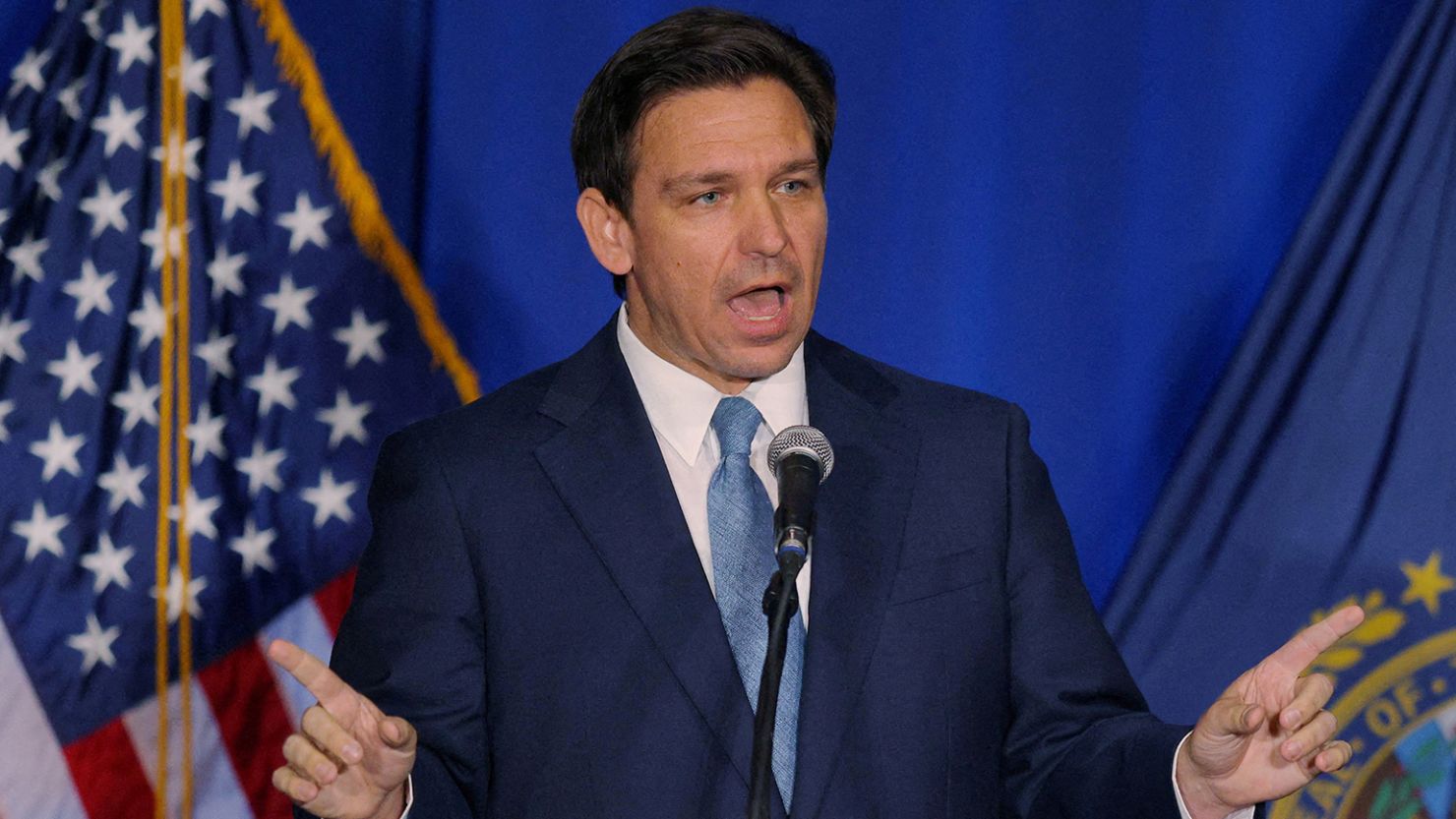Florida Gov. Ron DeSantis and his GOP allies have moved to shield the Republican leader from the state’s notoriously robust public records laws as he prepares to launch a campaign for the White House.
One bill advancing through the Republican-controlled state legislature would conceal information about DeSantis’ travel and who he has met with at the governor’s mansion. Another would allow state political committees – like the one where DeSantis has stashed $85 million for his future political ambitions – to report their fundraising activity less frequently.
Separately, DeSantis in court cases has lately claimed “executive privilege” to block the release of records and to keep staff from testifying – a power typically reserved for presidents and which none of his predecessors had previously asserted is entrusted to the state’s governor. If realized, it would give DeSantis tremendous new discretion to keep information about his administration from the public.
Democrats contend Republicans here are trying to protect DeSantis from news stories and opposition research that could reflect negatively on the governor as he nears a run for president in 2024. First Amendment advocates in the state warn these efforts will have a far-reaching effect on Floridians’ access to their leaders long after DeSantis’ turn in the national limelight.
“His path and aspirations are just so blatant and this is all retroactive cleanup for anything he might have done in the past,” said Sen. Jason Pizzo, a Miami Democrat. “This is the governor saying the public doesn’t have the right to know.”
DeSantis’ office did not respond to requests for comment.
DeSantis and the media have frequently clashed over how his administration has dealt with the state’s open government laws, which for decades have given Floridians a unique window into the inner workings of their government. Unlike in most states, public records laws here are enshrined in the state constitution to foster an environment of transparency and force officials to operate in the sunshine.
News organizations have sued his administration to obtain records that past governors regularly released upon request. Last year, a judge found DeSantis violated the state’s open records laws by failing to turn over documents related to the flights his administration arranged for migrants to fly from San Antonio to Martha’s Vineyard.
Now, Republican lawmakers have advanced legislation that would exempt DeSantis’ official travel from public records laws. The bill, which already passed the state Senate and is likely to pass the state House, would apply not just to DeSantis’ future travel, but also his extensive use of state planes throughout his time as governor.
Such information has long been public record and has at times led to uncomfortable disclosures about Florida governors. In 1996, the St. Petersburg Times cited these records in writing that then-Gov. Lawton Chiles, a Democrat, used the state plane to attend political events, igniting a controversy. In 1999, the Sarasota Herald Tribune found six months into Republican Jeb Bush’s first term that one-third of his trips on the state plane conveniently landed near his South Florida home. And in 2010, the Miami Herald reported a state plan took then-Gov. Charlie Crist to a fundraiser for his struggling campaign for the GOP nomination for US Senate.
Opponents say the legislation, as written, would also block from disclosure visitor logs for the governor’s mansion.
Republicans defended the legislation, saying it was needed to prevent potential bad actors from learning about the security details and travel habits of the state’s top executive. The bill would also exempt similar records related to the lieutenant governor, top legislative leaders and the chief justice of the state Supreme Court.
“Things are so different than even they were 10 years ago,” Senate President Kathleen Passidomo said at a press conference last week. “We have a young governor who has young children, a young family. God forbid something would happen because information is out there.”
Democrats are unconvinced.
“I can’t believe that we are making it even easier for him to not provide that information,” state Sen. Tina Polsky said during recent debate on the bill. “He lives in a government paid building. He gets government paid transportation. He is supposedly running for president and all over the country. We should be able to see if he is flying on our dime or a donor’s dime or his own dime or his (political committee’s) dime without compromising security.”
The bill would also exempt such disclosures “for persons for whom such services are requested by the governor.” The expansive language could allow the DeSantis administration to keep secret past and future trips arranged by the governor’s office even when he wasn’t involved, including some records related to future migrant flights, opponents said. CNN previously reported that Perla Huerta, the recruiter used by the state to locate migrants in San Antonio, and Larry Keefe, DeSantis’ public safety czar, traveled to Texas ahead of the mission to meet with state officials there and appeared to stake out migrants.
“If DeSantis wanted to fly the head of the Proud Boys to DC on the state plane and give him state protection, we won’t know,” said Barbara Petersen, executive director of the Florida Center for Government Accountability. “That may seem extreme, but that’s how expansive this bill is. It really is despotic.”
In other legislation, the state Senate passed this week a sweeping elections bill that changes reporting requirements for state political committees from monthly to quarterly. That legislation would affect disclosures for Friends of Ron DeSantis, where the Florida governor has parked leftover money from his reelection and continues to collect contributions ahead of his expected run for president. CNN first reported last year that it is anticipated that the money in that committee will be transferred to a super PAC supporting DeSantis’ expected White House bid.
Assertions of executive privilege
In addition to the legislative moves, lawyers for the DeSantis administration have recently pushed a novel argument in court cases involving access to state government: asserting that the governor has “executive privilege.”
In at least four cases since last year, DeSantis’ office cited the legal protection to block the release of records or keep his staff from testifying. Judges in three of the four cases declined to validate DeSantis’ argument. In one of those cases, a lawsuit over the state’s new congressional boundaries championed by DeSantis, a judge wrote: “Executive privilege, if one exists, would provide no relief in this case.”
But in January, a Tallahassee judge sided with the governor’s lawyers in a case over whether DeSantis should have to unveil who advised him on state Supreme Court picks. DeSantis in a 2022 interview said he had relied on “six or seven pretty big legal conservative heavyweights” to interview potential nominees, prompting a “J. Doe” to submit an anonymous records request for communications with those individuals.
DeSantis’ office objected, citing executive privilege. Leon County Circuit Court Judge Angela C. Dempsey agreed and for the first time established a precedent for executive privilege in the state. Her ruling leaned on previous court cases outside Florida.
Petersen, who has advocated on First Amendment issues for three decades in Florida, said she cannot recall a previous administration suggesting such power exists here. Her organization intends to file an amicus brief in the appeal of the case. CNN is part of a coalition of media organizations that is also seeking to appear as amicus in the state District Court of Appeal.
“I’ve never seen anything like this,” Petersen said. “We all feel like we’ve been beaten about the head.”
Catherine Cameron, a law professor at Stetson University in Florida, said she too “could not find any governor that had expressly claimed it before DeSantis.”
While presidents have claimed a form of executive privilege dating back to George Washington, Cameron said, it has not traditionally applied to governors. The idea, rooted in the separation of powers, generally has allowed occupants of the Oval Office to seek frank counsel from advisers without fear that the conversation will become public in congressional or judicial testimony.
Former President Donald Trump repeatedly attempted to broaden its scope, first by trying to hide special counsel Robert Mueller’s report on the Russia investigation from Congress and the public and more recently to keep Steve Bannon and others from testifying in cases related to the January 6, 2021, insurrection and his attempts to overturn the results of the 2020 election.
In recent years, some have courts extended such authority to governors in Washington and Montana. The ruling in Florida appears to conflict with the state constitution’s “express provision” and “broad law” giving public access to the records of government, Cameron said.
“This is quite a shift for us to be wholesale excluding documents from the public,” she said.
DeSantis’ office declined to say how the DeSantis administration will define “executive privilege” moving forward and how it will decide what records fall under this new power.
“I would hope, I assume, and I believe he will follow the law,” Passidomo said.


